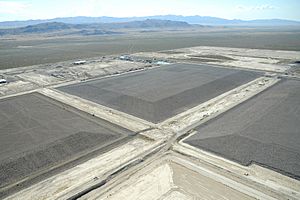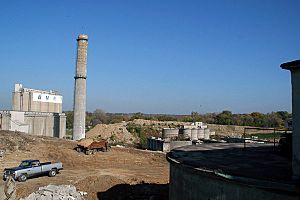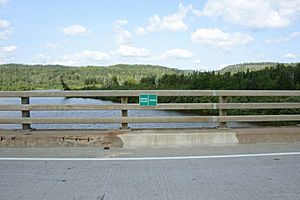Center for Land Use Interpretation facts for kids
The Center for Land Use Interpretation (CLUI) is a special group that studies how land is used across the United States. It's a non-profit group, which means it doesn't try to make money. Instead, it focuses on teaching people about the land. The CLUI started in 1994. It helps everyone understand how humans change the Earth's surface. They do this through art shows, special events, and trips to interesting places. They also keep a huge online collection of information and pictures.
Contents
What the CLUI Does
Exploring How Land is Used
The main goal of the CLUI is to "increase and spread knowledge about how the nation's lands are divided, used, and seen." This means they want to help people learn about all the different ways land is used in the U.S. They also want to show how people think about these places.
Programs and Projects
Exhibitions and Research
The CLUI creates many art shows and research projects. They also host public events. Their work covers many types of land use in the U.S. This includes land used for farming, energy, factories, and mining. They also look at land for communication, managing waste, and water. Other areas include transportation, shopping, homes, fun activities, and defense.
The organization puts on shows about how land is used in the U.S. You can see these shows at their own places. They also display them in museums and other learning spots. The CLUI also makes books, online tools, and leads tours. They give talks and host other public events all over the country. You can read about their activities in their yearly newsletter. It's called The Lay of the Land and is available in print and online.
CLUI Locations
The main office for the CLUI is in Los Angeles. Here, they have a display area that anyone can visit. They also have other sites across the U.S. One is in Wendover, Utah. This was once a military base. The CLUI ran an artist program there from 1996 to 2016. Another site is the Desert Research Station in Hinkley, California.
The CLUI is also helping to create the American Land Museum. This is a group of display sites in different parts of the country. Together, these sites show a picture of the national landscape. A person named Coolidge said that "the man-made landscape is like a cultural message." He believes it can help us understand who we are and what we are doing.
Field Trips and Tours
The CLUI organizes public trips to places where land is used in interesting or unusual ways. These trips have been written about in a book. The book is called Overlook: Exploring the Internal Fringes of America with the Center for Land Use Interpretation.
Online Resources
Discovering Land Use Sites Online
The CLUI has a collection of "unusual and excellent" land use sites. You can find these sites online through their database. This database has pictures taken by CLUI members. These photos are from the CLUI Photo Archive.
You can also find the Morgan Cowles Archive on the CLUI website. This is an online collection of themed photos. It has over 100,000 pictures from thousands of places. Many different people who worked with CLUI took these photos over the years. This archive exists because of support from the family and friends of Morgan Cowles, in his memory.
See also
- Cultural landscape
- Sense of place
 | Leon Lynch |
 | Milton P. Webster |
 | Ferdinand Smith |




